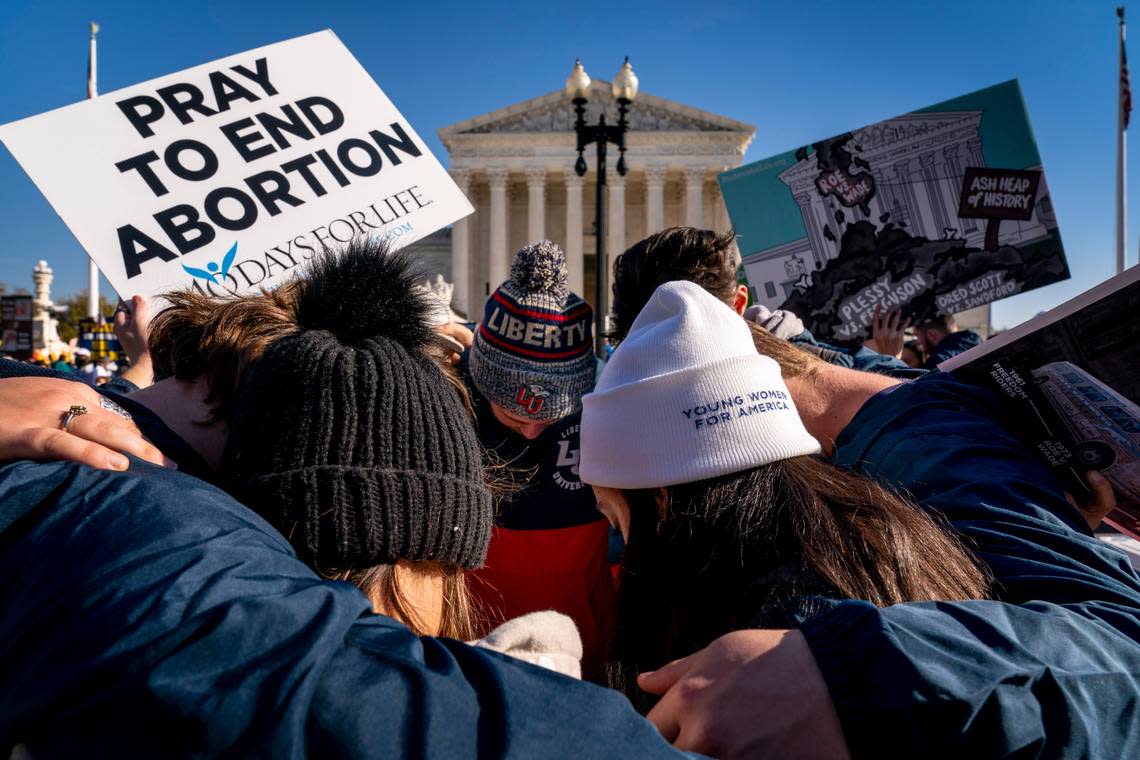Texas has a trigger law if Roe v. Wade is overturned. Here’s what could happen

If the U.S. Supreme Court overturns Roe v. Wade, most abortions in Texas would be a felony, the result of a recent state law that could hinge on a Mississippi case argued before the court earlier this month.
Justices on Dec. 1 took up a Mississippi law that prohibits abortion after 15 weeks of pregnancy. During the arguments, the court’s conservative justices appeared open to upholding the state’s law. There also seemed to be some support for rescinding Roe v. Wade and Planned Parenthood v. Casey, which reaffirmed Roe’s earlier decision. A decision is expected around June.
Texas’ new abortion law effectively bans abortions after about six weeks. But during the same session lawmakers also passed what’s often called a “trigger” law in which abortion would be banned if the Roe or Casey rulings were overturned, “wholly or partly.” The law would go into effect 30 days after the decision. Those who perform an abortion could face up to 20 years in prison and up to life if “an unborn child dies as a result of the offense.”
“The goal of this bill is to end the practice of abortion in Texas,” said Rep. Giovanni Capriglione, a Southlake Republican who authored House Bill 1280.
The bill provides an exception if the patient is in a “life-threatening physical condition” related to a pregnancy that puts the patient at “risk of death or poses a serious risk of substantial impairment of a major bodily function.”
Capriglione thinks the court is poised to overturn Roe and leave abortion regulations up to states. The bill he authored would allow for rules to be in place without the Legislature again meeting, he said.
Capriglione described the law as conforming to whatever the court ultimately rules.
“It just seeks to ensure that if this happens — if the court overturns Roe v. Wade or to the extent that it overturns Roe v. Wade — we have a mechanism here in the state to start this practice as soon as possible,” Capriglione said.
But legal experts have raised questions about how the law would be carried out if Roe or Casey “partly” were overturned.
“The text of the statute has to tell you how it would be applied, and it just doesn’t, right?” said UT Austin law professor Elizabeth Sepper. “It doesn’t provide a measure of clarity.”
It is unlikely the court would frame its decision as a partial overruling, she said.
“I think there’s just really wide open questions as to whether and when the law would go into effect in the absence of an explicit and express overruling of Roe v. Wade,” Sepper said.
SMU law professor Joanna Grossman also questioned how the law would work were Roe partially overruled.
“Obviously if they say Roe and Casey are overruled, that’s relatively clear, right, that this law springs into action,” Grossman said. “The partly is where you would have maybe a difference of opinion or something for a court to talk about later.”
A dozen states have “trigger” laws on the books, according to the Guttmacher Institute, a research organization that works to advance sexual and reproductive health rights. Five states use language similar to Texas’ “wholly or partly” provision — Arkansas, Kentucky, Louisiana, Missouri and Tennessee.
As the Supreme Court weighs the Mississippi case, it also has a Texas abortion case before it. The court in November took up Texas’ Senate Bill 8, which prohibits abortions after cardiac activity is detected in a fetus. Texas’ “fetal heartbeat” law wasn’t challenged on constitutional grounds, unlike Mississippi’s law. Instead the court was looking at Texas’ civil enforcement mechanism, which permits almost anyone to sue a person who performs an abortion.
Texas’ trigger law includes a potential civil penalty. A person who violates the law by performing an abortion could face a $100,000 fine for each violation. Senate Bill 8 can result in damages of at least $10,000.
As litigation plays out, Texas’ ban on most abortions remains in place. Amy Hagstrom Miller, the founder and CEO of Whole Woman’s Health, which has a Fort Worth clinic, said it has turned away 70% to 80% of people who need abortions.
“I think we providers are in a similar place that our patients are in,” she said. “It’s confusing. It’s worrisome. There are so many uncertainties. We are trying to navigate those and run medical practices that can be available and open and welcoming for all of the people who need us, but the state is making it next to impossible for us to do so.”

 Yahoo Movies
Yahoo Movies 
